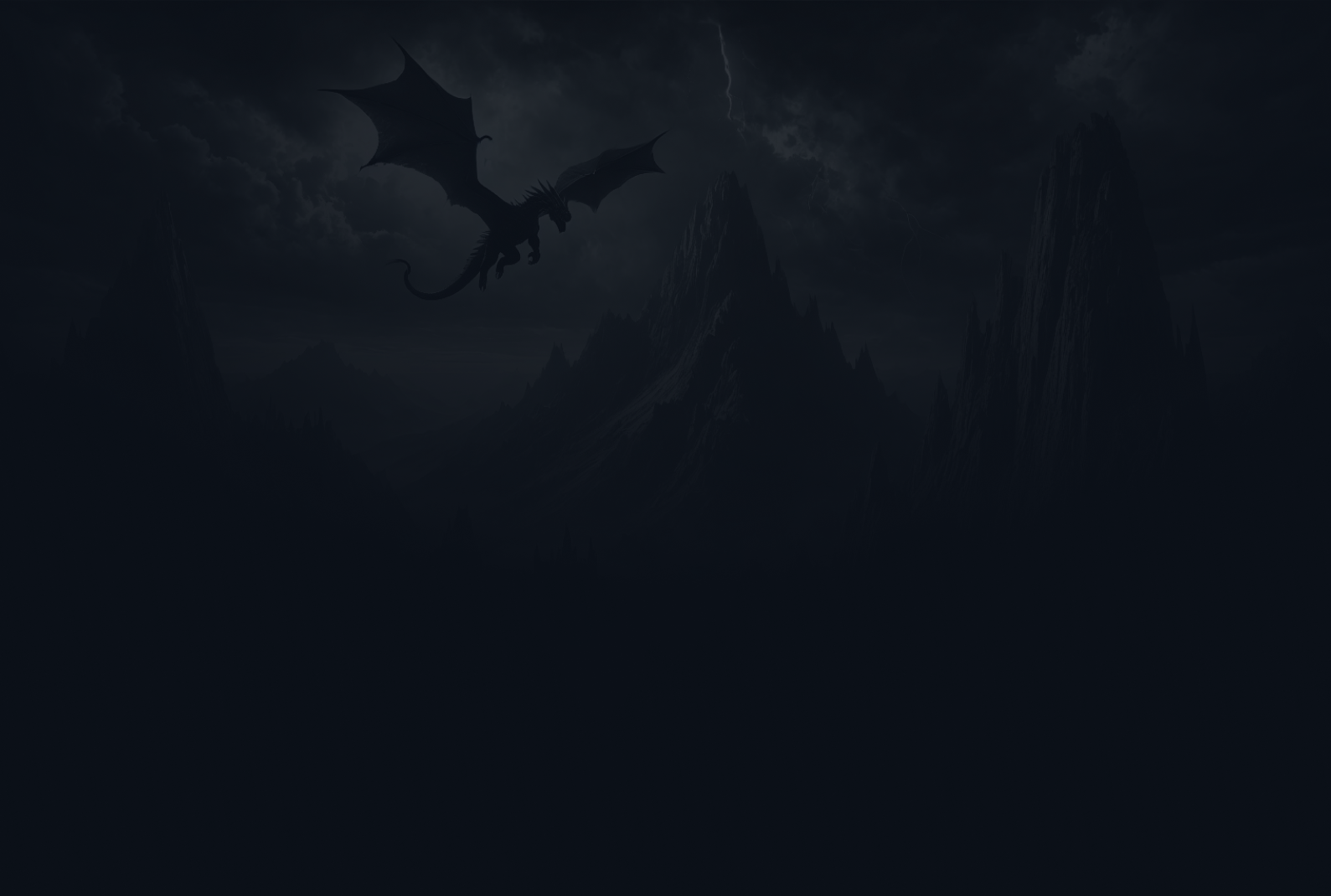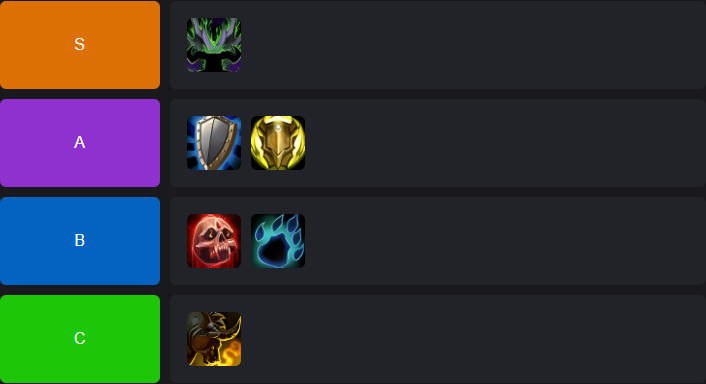

Are you prepared to take center stage as Tank in Season 2 of The War Within? Wondering which specializations will give you the best shot at climbing the Mythic+ ladder and pushing your RIO higher than ever? You're in the right place.
In this breakdown, we’ll reveal which tank specs are currently dominating the meta — and which ones are struggling to keep up. We'll dive into the class mechanics, strengths, and shortcomings of each spec, so you can make the best choice for your mythic+ journey!
The performance gap between the top-performing and bottom-tier tanks has significantly narrowed compared to what we saw in Season 1. Although some differences in strength and utility among the tank specializations remain evident, the current state of balance presents a much more even playing field.

This tier list is not final as Blizzard is expected to make tuning adjustments during the season, so we'll update this article regularly.
Let's break down what all these A,B and Cs above actually represent:
Vengeance Demon Hunter stands head-and-shoulders above the rest this season. It boasts an unparalleled combination of mobility, damage output, and tanking utility. VDH can zoom around pulling packs with Infernal Strikes and Sigils and mitigate tons of damage through self-healing and strong cooldowns (like Demon Spikes and Fiery Brand).
This spec’s group utility is top-notch as well – providing a magic damage debuff for allies and even a party-wide defensive with Darkness. In Season 2, Vengeance has dominated the leaderboards, as skilled players leverage its toolkit to handle the toughest pulls with confidence. Simply put, Vengeance DH has no real weakness as of right now, making it the gold standard S-tier tank for Mythic+.
Protection Warrior is propelled by a significant rework in Patch 11.1, after which Prot Warriors have surged back into the meta as an excellent tanking choice. They received hefty buffs to their damage, allowing them to hit hard while tanking – a big deal for Mythic+ timing! A Prot Warrior brings valuable group buffs (Battle Shout for extra attack power and Rallying Cry for a health boost in emergencies) and boasts rock-solid mitigation with Ignore Pain soaking up damage. Their revamped talent tree made their defensive rotation more streamlined, so they feel sturdier and deliver more consistent DPS than before.
While Warriors lack the self-heal of a Blood DK or the magic cheese of a Demon Hunter, their physical durability is second to none. With great threat generation, an AoE stun (Shockwave), and newfound damage output, Prot Warrior is easily an A-tier tank that can take any dungeon with authority.
Protection Paladin remains a versatile juggernaut just a notch below Vengeance in overall power. This spec packs incredible utility and damage potential: a well-played Prot Pal can pump out surprising DPS on trash packs while keeping the party safe. Paladins have an answer for almost every situation: strong self-healing (Word of Glory), emergency panic buttons like Divine Shield, and a suite of blessings to protect allies (Blessing of Sacrifice, Blessing of Protection) or even top someone up in an instance (Lay on Hands).
They also provide a party-wide 3% damage reduction aura by default, which is a nice passive perk. Earlier in Season 2, Prot Paladin saw some nerfs to its damage and durability, but skilled players barely felt the hit – Paladin tanks continue to comfortably push high keys by leveraging smart play and their unique tools. While they don’t quite reach the Demon Hunter’s level of ease and dominance, Prot Paladins are firmly A-tier due to their blend of offense, defense, and group-saving utility that few others can match.
Blood Death Knight is the classic example of a tank that’s viable even in very high keys, yet sits in B-tier this season due to falling just short of the top meta.
Blood DKs bring unparalleled self-sustain – their ability to heal back damage with massive Death Strike and shields (via Bone Shield and Blood Shield) makes them extremely self-reliant. They also offer unique utility that groups love, including Gorefiend’s Grasp to gather or reposition mobs and a battle resurrection to save a wipe. In practice, a Blood DK can feel immortal when played well, turning dangerous spike damage into mere scratches by instantly healing up.
The drawback is that Blood’s damage output and clear speed lag behind more powerfull tanks; they simply don’t contribute as much DPS, which matters in tighter timers. Additionally, if their self-healing rotation falters, they can become spike-prone without the high passive mitigation of other tanks. In Season 2, Blood DK remains a strong choice for those who master its rhythm: you can absolutely time keys with a Blood tank, but it demands more finesse and pre-planning, keeping it a step below the flashier top tanks.
Guardian Druids have improved compared to last season, but they’re still a bit on the back foot, making them a very average tank pick. In Season 2, Guardians benefitted from some buffs to their damage and talents, which boosted their threat and damage output slightly and gave them more tools to play with. They continue to sport a gigantic health pool and steady damage reduction through Ironfur stacks, making their damage intake smooth and predictable. A Guardian brings useful group utility as well: Mark of the Wild, an on-demand combat resurrection, and Stampeding Roar for group movement speed – these are all great perks for Mythic+.
They also have high mobility in bear form and Ursol’s Vortex for crowd control when needed. However, even with these strengths, Guardian Druids struggle to match the damage and lockdown power of the A-tier tanks. They lack a strong active mitigation beyond Ironfur and Frenzied Regeneration, so they can feel the hurt in extreme high keys without external support. Their DPS, while better than before, is still middle-of-the-pack. All of this leaves Guardian as a less popular choice among top players. It’s a perfectly capable tank for +10s and above as you can time keys reliably as a bear, but in the current meta most groups lean toward tanks that offer just a bit more oomph or utility.
Brewmaster Monks again find themselves at the bottom of the tank rankings, this time in Season 2 ot TWW. With minimal changes or buffs this patch, Brewmasters are essentially working with last season’s toolkit in a field where everyone else leveled up. The good news is Monks still have the powerful Stagger mechanic (unique to Brewmasters) which passively smooths incoming damage and can make them deceptively tanky when managing Stagger properly.
They also provide strong crowd control and utility: Leg Sweep brings a clutch AoE stun, Ring of Peace can control mobs or help kite, and they even apply the Mystic Touch debuff to increase your party’s physical damage.
The bad news is that beyond those perks, Brewmasters is outclassed across the board. Their damage output is lower than other tanks, meaning slower clears and less contribution to the group. And while sturdy against steady damage, they can be brittle against burst if Stagger and purifies aren’t enough. Unlike a Prot Paladin or DH, Brewmaster has no group-wide defensive cooldown or emergency immunity to bail them out either. In practice, this means playing a Brew in high Mythic+ requires flawless play – you cannot afford mistakes. A skilled Brewmaster can absolutely still tank +15s effectively, but given the effort vs. reward, most players have gravitated to easier, stronger tanks. Brewmaster is a fun challenge, but until it gets some tuning, it sits in C-tier for Season 2.